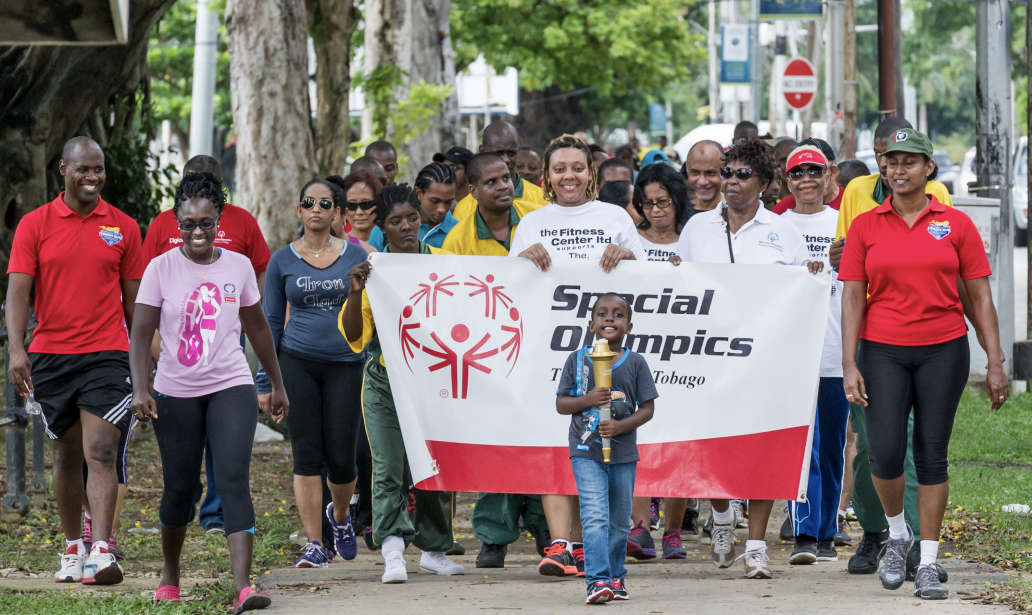“A special person can do anything we can — and sometimes, even a little better!”
This is the belief of the global organisation Special Olympics, and our local arm in Trinidad and Tobago upholds this core principle.
The catalyst for a change in the national perception about intellectually challenged persons
Since its introduction to the country in 1982, Special Olympics Trinidad and Tobago (SOTT) has grown from strength to strength, with a widening base of volunteer supporters and a larger group of athletes competing in each instance of the biyearly event.
At the most recent Special Olympics Summer Games in 2015, our largest contingent thus far comprised of 64 athletes, who amassed 48 medals — 15 gold, 9 silver and 24 bronze.
With over 1200 athletes training year-round, and approximately 200 coaches volunteering their time and dedication, SOTT is a positive force to be reckoned with — and the catalyst for a change in the national perception about intellectually challenged persons.
Showing the world that they are capable of excellence“One key misconception is that there is this big divide, and a ‘normal’ person cannot communicate with a ‘special’ person; that they don’t have the same emotions we do, or that they are persons to be afraid of or pitied,” says Mrs. Candilla Berment-Harper, Chairperson of Special Olympics Trinidad and Tobago.
“Through the connection of sport, we provide a forum for special persons to interact with their peers of all abilities, while also showing the world that they are capable of excellence.”
The Road to Special Olympics
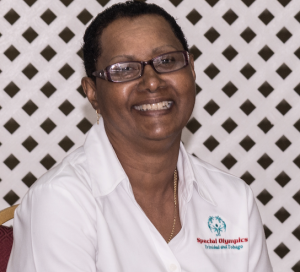
Mrs. Candilla Berment-Harper has been involved with Special Olympics in various capacities for over 30 years.
She can still recall her first interaction with a special person, which took place in her early childhood, when her mother taught a child with Down Syndrome in their home.
As an adult, she willingly accepted a friend’s offer to take his place on a Special Olympics Games committee, and soon worked her way up in the organisation. SOTT is currently run by a Board of Directors that consists of 14 persons including a doctor versed in those with special needs, an experienced nutritionist/dietitian, and other working professionals, as well as a ‘self-advocate’ special person.
Mrs. Harper’s journey has been both fulfilling and enlightening, and her genuine passion to help others prevails.
The organisation operates on a volunteer basisIt is a passion shared with many others around the world — which is fortunate, as the organisation operates on a volunteer basis.
Founded by advocate for children’s health and disability issues, Eunice Kennedy Shriver (sister of former U.S. President John F. Kennedy), the beginnings of Special Olympics occurred in the early 1960s at Camp Shriver, a day camp for the intellectually challenged.
In 1968, the First International Special Olympics Games were first held in Chicago, U.S.A., with a group of over 1000 individuals competing in track and field, swimming and floor hockey.
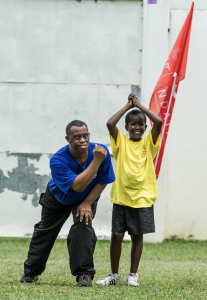
Today, more than four million athletes in over 170 countries participate in over 32 sports including:
- Aquatics
- Athletics (Track and Field)
- Badminton
- Equestrian Sports
- Floor Hockey
- Football (Soccer)
- Table tennis
- Tennis
- Bocce
- Basketball
- Power lifting
- Volleyball
- Cycling
- Cricket
- Gymnastics
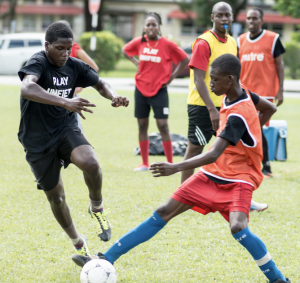
Special Olympics is founded on the belief that people with learning disabilities can, with proper instruction and encouragement, learn, enjoy, and benefit from participation in individual and team sports.
An international thrust towards ‘unified play’“Beyond the aspects of physical fitness, it also develops social skills, including interaction not only with special peers but also with other persons in their same age or developmental group,” Mrs. Harper says.
“Globally, there is an international thrust towards ‘unified play’, which allows both special persons and normal persons to play together. This allows family members and friends of special persons to participate, and shows that total inclusion is possible.”
Special Considerations
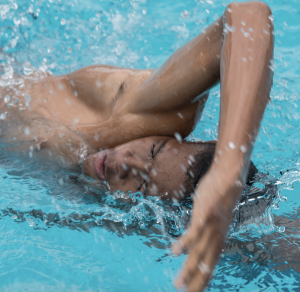
Special Olympics adheres to the principle that sports should be played under normal conditions as far as possible, and should be adapted only as necessary to meet the needs of those with mental and physical limitations.
Sports should be played under normal conditions as far as possibleWhile many sports are played almost exactly as usual, there are also specially modified events for those less able, such as the 25m Assisted Walk (athletics), the 15m Flotation Race (aquatics), and events for those with wheelchairs.
Persons are eligible once they have been identified by an agency or professional as having an intellectual disability, cognitive delays as measured by formal assessment, or significant learning or vocational problems that require specially-designed instruction.
Athletes above the age of eight (8) of all abilities are encouraged to participate, and the competitions are structured to allow those of similar abilities to compete in equitable divisions.
For the biyearly Games, SOTT assembles a team that consists of athletes of all abilities — high-functioning, average, and low-functioning.
The importance of involving those who are lower-functioning“Whereas more high-functioning athletes may perhaps do team sports such as basketball, cricket, or football; for our athletes with cerebral palsy, for instance, there are equestrian sports — which are coached by our very own Police Mounted Branch in St. James,” explains Mrs. Harper.
“We always stress on the importance of involving those who are lower-functioning; often, these may be the ones who can most benefit from the opportunity to build upon their social and athletic skills, and to improve their general health and well-being.”
Healthy Athletes
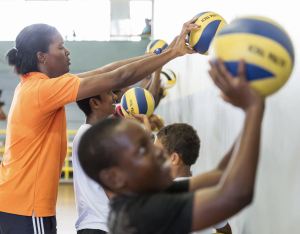
Regardless of ability level, health and well-being is a key focus of the Special Olympics, which is underscored by the Special Olympics Healthy Athletes© initiative.
This initiative was developed to improve each athlete’s ability to train and compete in Special Olympics, and focuses on aspects including:
- Special Olympics Special Smiles, Dental examinations
- Special Olympics Opening Eyes, Vision examinations
- Special Olympics Healthy Hearing, in which athletes have hearing screenings.
- Special Olympics Fun Fitness, in which athletes learn injury prevention through stretching exercises
- Special Olympics Health Promotion, in which athletes learn the components of a healthy lifestyle involving regular exercise and good nutrition choices.
- Special Olympics Fit Feet, podiatry
- Special Olympic Medfest, sports physical exams
This is crucial for the benefit of Special Olympians. One reason is that those with mental disabilities may not be aware of physical problems they are experiencing, or may not be able to convey their symptoms effectively.
Their mental disability has been the only focus, but other physical issues may arise“In T&T, we have noticed that some special persons are somewhat separate from others and do not get the opportunity to learn to take care of their own health; or perhaps, their mental disability has been the only focus, but other physical issues may arise,” explains Ms. Berment.
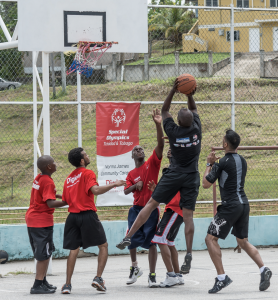
“It is heart-wrenching to know that some go through life without ever having the opportunity to do something as simple as a blood test, an eye test, or a visit to a dentist; particularly in families with little financial means, or in rural communities.”
Beyond this focused initiative towards building healthier athletes, Special Olympians also prosper from a range of benefits of physical activity, such as a lowered risk for cardiovascular disease and obesity, among other health benefits.
Also, they gain many emotional and psychological benefits, including self-confidence, social skills, and self-esteem.
Special Olympians also prosper from a range of benefits of physical activityMoreover, through the drive to empower special persons, many athletes have greatly improved in aspects relating to their daily lives at home, in the classroom, on the job and in their communities. Past and present Special Olympians include self-advocates who have held leading roles at conferences and other events such as the National Down Syndrome Congress Annual Convention.
These are some of the benefits discussed when SOTT visits the special schools located throughout Trinidad and Tobago, in a constant recruitment drive to promote Special Olympics.
Getting Involved
Alongside the benefits to the special athletes themselves, Special Olympics also provides many avenues for those from all walks of life to participate in any way.
Community volunteers are always welcome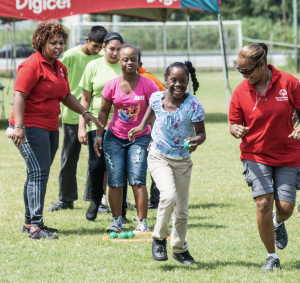
For the corporate world, contributions of any kind are greatly appreciated, particularly those that are medium to long-term. One of SOTT’s largest sponsors over the past few years has been the Digicel Foundation, which has enabled the organisation’s resounding success.
Community volunteers are always welcome, and there are many areas in which one can assist, such as administration, medical, transportation, registration and recording, fundraising, marketing, and general assistance on event days to prepare food or act as guides to bring the athletes to the stage.
For those who wish to coach or mentor the athletes, SOTT provides initial training and ongoing seminars and group sessions to discuss on developing relationships with the special athletes.
Just as normal as you and me; in fact, they may think we are strange!“However, while we may be able to share tips and past experiences, at the same time everyone will have their own unique experiences,” notes Mrs. Harper.
“The important thing is to just be patient if a special person might take a little longer to learn something. At the end of the day, they consider themselves just as normal as you and me; in fact, they may think we are strange! Once we can all realise just how similar we are, rather than how different — that is the main goal of Special Olympics.”
Further Information
- There is no cost to participate in Special Olympics.
- Eligibility is at age eight (8), with no maximum upper age limit.
- Special Olympics is different from Paralympics, which is designed for those who have physical disabilities only. While a Special Olympian can have both physical and mental disabilities, if no mental disability exists the person does not qualify to participate in regular Special Olympics.
- Lower-ability athletes who are not yet ready for team play can participate in Individual Skills Competitions – e.g. in football (soccer), athletes can earn medals for performing the skills of Dribbling, Shooting, and a Run-and-Kick event.
- There is also a Special Olympics Motor Activities Training Program (MATP) for persons with significant intellectual and/or physical limitation who do not yet possess the physical and/or behavioural skills necessary to participate in Official Special Olympics sports. The program provides a comprehensive motor activity and recreation training curriculum for these participants.
- Another key Special Olympics initiative is the Family Support Network, which helps families to help each other. Based on the Parent-to-Parent model, veteran Special Olympics families have an opportunity to mentor families who are new to Special Olympics, providing them with informational and emotional support.

